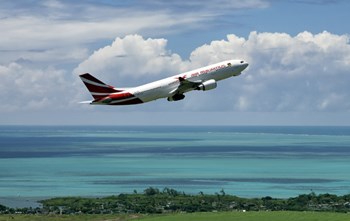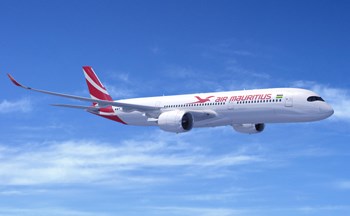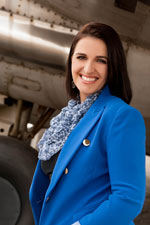
Top stories






AutomotiveHilux Custom Builds offers purpose-built solutions for your business
Toyota South Africa Motors 16 Feb 2026
More news


Marketing & Media
Ads are coming to AI. Does that really have to be such a bad thing?














Carla da Silva:The role was the same as per my currently role here at Air Mauritius. There are however always new learnings. I met a different team with different ideas and new challenges. In a very short period of time I had been able to assess the challenges and opportunities. The key learning for me is that one always needs to dissect all issues in a comprehensive manner before making decisions despite decision making being key to any business. PR flair that Virgin possesses is definitely a learning I embraced and will certainly apply that at MK.
da Silva: I have previously worked at SAA, AF, KLM and now MK the commonalities is that the aviation sector possesses the same challenges across all airlines. Understanding the nuts and bolts is imperative however being able to visionary, innovative is just as critical.
The small ones have to be extremely effective and efficient as there is no additional funding should things go wrong. So a focused airline model and strategy is key to a smaller airline although just as key for a big airline.

da Silva: The secret to MK is that is a focused airline with passionate people and effective leadership. It is successful country and renowned in the African continent for good governance and banking expertise.
da Silva: The plans for this region is to establish MK as a leading airline that not only takes you to Mauritius but to all emerging, developing markets such as China and India, as well as established markets such as Australia due to the location and travelling time.
There is also a need to create awareness that Air Mauritius is an International airline that flies beyond Mauritius with seamless connections, excellent rates and less flying time to beyond Mauritius destinations. So diversification in terms of corporate is important to our business. Many South African businesses have established offices in Mauritius because it is a good investment market and embraces business.
MICE, is also an arena MK specialises in so Meetings, Incentives, Conferences is an area I want to grow further.
da Silva: I have seen an article in this regard written by the travel trade in South Africa.
Unfortunately there is no guarantee on the oil prices and the Rate of Exchange is another major factor to consider in this regard.
da Silva:MK has not been approached by any customers.
da Silva: There interesting innovative developments around social media and e-commerce. Air Mauritius has established a focused plan to ensure that social media and ecommerce channels are available to the consumer. It is important to be active in this space as these channels talks to the end user directly establishing loyalty and a relationship with our partners and customers.
da Silva: The government of Mauritius immediately established plans of actions in this regard and specific countries were not permitted to enter Mauritius.
We have not had any specific issues, we have been extremely alert and cautious in this regard.

da Silva: Potential opportunities for MK and other airlines really encompass ancillary revenue opportunities, adding value to the consumer and choice in terms of the different value propositions available. Other potential areas include social media engagement, e-commerce channel as it is an effective distribution channel but more importantly diversification in terms of partner/customer channels.
Innovation is definitely the name of the game.
da Silva: Constantly engaging their partners and customers. Finding new ways to address the consumer choice and needs. Relationship Management is still an effective strategy creating value and long term, sustainable relations.
Being innovative, coming up with different, new and fresh approach to business.
Value for money propositions establishing reward and loyalty.
Partnerships not only with customers but also with suppliers, airlines and other key associations.

da Silva:There are some that we need to be aware of and address:
• From a South African perspective the possible introduction of the "unabridged certificate regulation, new immigration requirements" is definitely going to impact the tourism sector and airlines very negatively not only from an outbound but also from an inbound perspective.
• The ZAR/EUR/USD RoE challenge is very real for the aviation sector considering how we purchase fuel, pay for aircraft parts along with other costs, which are not paid in the local currency.
• Challenging economy, labour relations and protracted strikes are still a concern.
• South Africa's reputation in terms of safety, security remains a challenge for travellers.
• The Top 10 global risks which all impact aviation as per World Economic Forum, Global Risks 2015 : Interstate conflict, Extreme weather events, Failure of national governance, State collapse or crisis, Unemployment or underemployment, Natural catastrophes, Failure of climate-change adaptation, Water crises, Data fraud or theft and Cyber-attacks.

• Top 10 risks in terms of Impact: Water crises, Weapons of mass destruction, Interstate conflict, Energy price shock, Failure of climate-change adaptation, Fiscal crises, Unemployment or underemployment, Biodiversity loss and ecosystem collapse, spread of infectious diseases and terrorist attacks.
• 2015 presents rising technological risks, notably cyber-attacks and new economic realities. Information flows instantly around the globe and emerging technologies have boosted the influence of new players and new types of warfare.
• These global risks transcend borders and spheres of influence so the aviation industry has to work closely with all their stakeholders and governments as these risks also threaten to undermine the trust and collaboration needed to adapt to the challenges of the new global context.
da Silva: Yes MK has purchased new aircraft. The re-fleeting exercise will take place in a phased manner. The first two A350-900 planes will be delivered in 2017 through operating leases from AerCap Holdings and the remaining four will be purchased from Airbus, with two aircraft to be delivered in 2019 and the remaining in 2020.
Air Mauritius has also reserved its right to exercise an option to place additional orders of up to three A350 between 2023 and 2025 on the same terms and conditions that led to the selection of the first four aircraft with Airbus.